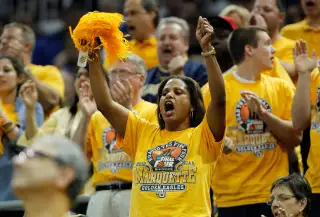Only 12% of Private College Students Actually Pay Those Crazy-High Tuition Prices. Here's Why

You know those ridiculous tuition prices you hear horror stories about? It turns out they are largely fictional—at least for many private colleges.
The percentage of freshmen paying full sticker price at private colleges fell to an all-time low of just 12% during the past year. And on average, private-college freshmen got grants to cover a record 56% of their pricey tuition, according to a survey released today by the National Association of College and University Business Officers.
As result, the actual net price paid by this year’s private college freshmen for the 2016-17 academic year was slightly lower, after accounting for inflation, than the price paid by freshmen in the fall of 2015, NACUBO found.
The most expensive private colleges—including most Ivy League institutions—charge in excess of $50,000 a year just for tuition. But the average private college charges about $33,500 in tuition, according to the College Board. The typical private school is now awarding freshmen grants averaging about $18,000 a year, according the the new report—bringing average net tuition down to about $15,000 a year.
Of course, those price cut numbers are national averages. At many elite prestigious colleges, where lots of wealthy applicants are eager to pay any price to attend—schools like Brown University, Rice University and Swarthmore—roughly half of the students pay full price.
On the other hand, there are more than 200 private schools, including Duquesne, Marquette, and Ohio Wesleyan, that offer every single freshman at least some scholarship aid. (See Money’s list of the 91 high-value colleges where every freshman gets a scholarship.)
The good news for today’s high school students: The effective price cuts will likely continue for the foreseeable future because of the basic economics of supply and demand, says, Ken Redd, NACUBO’s director of research and policy analysis. “You have roughly 3,000 private colleges in the U.S., chasing after a declining number of potential new students,” he says. And whenever demand shrinks, he notes, suppliers tend to have to cut prices to attract customers.
Higher-education economists cite several reasons that a growing number of private schools will likely continue to offer more aid:
- American demographics: The number of people who turn 18 in any given year is falling—declining to 4.2 million last year from 4.5 million in 2010, according to the Census Bureau. And the number of traditionally aged potential college freshmen isn’t expected to start rising in most areas of the country for another decade, says Redd.
- Campus locations: Hundreds of private colleges were built in the 19th century to serve communities that boomed during the manufacturing and agricultural eras. But those communities and economies—places like Pennsylvania’s steel belt and the industrial Midwest—have declined in both population and wealth. “A lot of small colleges are in areas that are now demographically weak, so they have to compete heavily on price,” says Susan Fitzgerald, who analyzes higher education for Moody’s. That’s going to continue, she believes: “We certainly don’t see any letup in pricing pressure."
- International declines: Many U.S. colleges, Redd says, are worried that President Donald Trump’s efforts to crack down on immigration will discourage wealthy overseas parents from sending their students to American campuses. While he notes that evidence is anecdotal for now, Canadian colleges—often seen as a close alternative—have already reported a spike in applications.
- Consumer psychology: College officials say they have to keep raising sticker prices and scholarships because parents and students are choosing colleges that give them something to brag about. “What do you believe is more attractive to a student and family: a $40,000 a year school that offers a $20,000 scholarship or a $20,000 school that offers no scholarship?” asks Luke Behaunek, dean of students at Simpson College in Indianola, Iowa—which awards 100% of freshmen a scholarship. Winning a scholarship “makes you feel significantly different about the quality, value and appreciation you are getting from the institution,” he says.